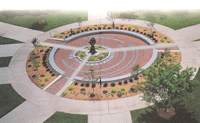
Jivee D. Tandon
is honored with a Brick from Dharam V. Chopra.
Jivee Devi Tandon, my father's aunt, was always addressed by all of us as ChaChi (Aunt in English). She looked upon my father as her son, and came to live with us after she lost her husband, Kali Charan, and her only child. When my father passed away, my mother was quite young and facing a lot of difficult problems and responsibilities. Jivee assumed a very important and significant role looking after us, and helping my mother in dealing with numerous social and legal matters. Jivee never wavered in her confidence in the abilities of my mother to carry out her obligations and responsibilities towards us all.
Since I was the eldest child, I had some vivid recollections of the time that I spent with her, of her love and affection for our family, and of her utmost concerns to see we were well taken care of and comfortable. My recollections of her take effect after she had lost her eyesight. She was one of those two relatives who stood by us at every step of the way.
She was a person with a noble soul, and a kind and compassionate heart. I can always picture her in my mind, although I am sad to have no photograph of her, since cameras were not common in those days. As a child, I would sit with her for hours at night to listen to very interesting, simple stories marked with humor and religious beliefs. She never went to school herself, but always advised me to go to school and to be a good student--something I did not care for in those days. As the years passed by, her words kept coming back to me.
She would not permit our mother to scold us. She once picked a fight with my mother and left us to live with some other relative. She refused to return when my mother went to bring her back, and agreed to return only when my mother appealed to her in the name of the children.
A few years after my father's death, when I was in the fifth grade, she expressed a desire to spend the remaining years of her life in Haridwar, considered a very sacred place by Hindus, where the ashes of the dead are immersed in the holy river Ganges. Haridwar has numerous ashrams, Hindu monasteries, where people are provided with free food and lodging. It was a common belief in those days, and is still believed by many, that to die in such a holy place is like going to Heaven.
My mother was very hesitant and reluctant to let her go. I vividly remember her hugging me for the last time at the railroad station, and never forgot the exact spot where she boarded the train bound for Haridwar. That was a very sad day of my life.
We never heard from our Aunt Jivee. She was not able to read or write. Recently my mother told me that a friend of hers, Mrs. Parkash Wati Duggal, did meet Jivee accidentally.
While leaving for Haridwar, Jivee carried very few material objects and left everything for us. My thoughts have transported me so often to the days when she was with us. I have wondered of her last days in Haridwar. My mother becomes very emotional whenever I strike up a conversation with her about ChaChi or my father.
I feel very lucky and fortunate that the formative years of my life were spent with someone who taught me all about unselfish love. I am very happy to honor her for all the selfless sacrifices she made for this family of ours, and for touching my life in so many ways.
Submitted by Dharam V. Chopra
September 14, 1998










